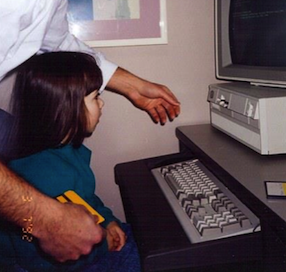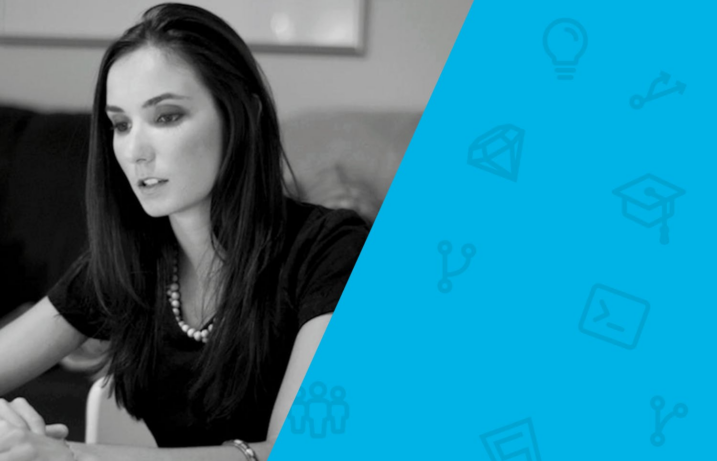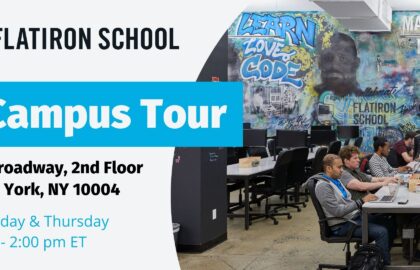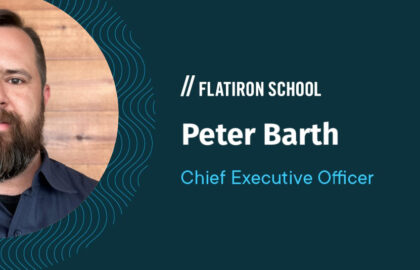This month, we’re celebrating Flatiron School’s fifth birthday by launching our Future Founders Scholarship. We’re also spotlighting Flatiron alums who have gone on to leverage their programming skills as entrepreneurs. Today, we chat with Samantha Radocchia – a lifelong techie (and onetime competitive skydiver!) who came to Flatiron School to get a more functional understanding of computer programming to take her company to the next level.
What initially inspired you to pursue entrepreneurship?
I grew up watching my father and grandfather grow and scale a small family retail business to a large national chain. I suppose entrepreneurship is my blood, quite literally.

Samantha learning MS DOS as a child.
You started learning to code at an early age. Can you tell me more about that early coding experience? What then inspired you to attend Flatiron School?
I started playing around with computers at a young age and was always fascinated with languages. So fascinated, in fact, that I went on to study linguistics as an undergraduate. The theoretical underpinnings of language – whether it be written, spoken, gesture, or computer – fascinates me. My early coding experience was pretty basic. Simple HTML & CSS websites back in the late 1990s/early 2000s – nothing too wild. I decided to attend Flatiron School after starting my first tech company. I was three years into the company as a non-technical co-founder of a tech startup, had finished up my Master’s Degree at NYU in Media, Culture, and Communication, studying the relationship between technology and society. I wanted to get a more functional and granular understanding of the computer programming.
What was your favorite part of the Flatiron School experience?
Learning from Avi. What a riot. He’s a seriously smart individual and I feel honored to have been able to watch him what he does best: code and teach.
Could you give us a quick intro to your company, Chronicled?
Welcome to Chronicled, Inc.: a leading pioneer in Trusted Internet of Things (IoT) and Supply Chain Solutions.Chronicled develops turnkey solutions enabling physical property and IT platforms to be securely linked to a blockchain. We power smart supply chains by leveraging secure identities, trusted IoT data, and automated business logic. Chronicled is also a founding member of the Trusted IoT Alliance, with the mission of creating tools and standards to connect IoT and blockchain ecosystems to deliver business value. Some of our key product and platform offerings include:
-
Cold Chain Monitoring
-
Tamperproof Sealing
-
Supply Chain Compliance
-
Supply Chain Automation
-
Secure Product Identity
-
Blockchain Backend Integration
The company has published an open source protocol for the Internet of Everything (IoE) at Chronicled Open Source. Building on top of that protocol, Chronicled’s proprietary platform, comprising of hardware and software components, enables development of consumer and enterprise applications for physical goods, devices, machines, and product packaging.
“I’d say developers have a lot of advantages when it comes to launching a company. You’ve got the product thing down and can build it yourself.”
How have you leveraged your programming skills in creating and running Chronicled?
Yes, sometimes I get my hands dirty and in the code. Anything from managing our static websites, doing some web design, working in our iOS, Android, and Web Apps, to learning Solidity, the language used to program Smart Contracts for the ethereum blockchain. Actually, I’m getting really into Solidity these days. I’m most excited for my next venture, which will be a subscription-based women’s razor company. I’m going to be doing a lot of the hands-on development work for our app and website.
What advantage would you say a developer has when it comes to launching his or her own company?
I’d say developers have a lot of advantages. You’ve got the product thing down and can build it yourself; however, that’s only a fraction of the battle in building a company. Requirements gathering, roll out, marketing, BD, fundraising, design, and beyond: you need it all.
Congrats on being named to Forbes 30 under 30! How did it feel to be named a part of that list?
Thank you! It was an honor. I’m really excited to be part of the list, particularly in the Enterprise space; however, my strengths really lie in building and rolling out consumer products.
Finally, any advice for programmers who feel an entrepreneurial drive?
Build, build, build. Sell, sell, sell. Then do it again!
Inspired to follow in Samantha's footsteps? Apply to our Future Founders Scholarship – a $2,250 scholarship to our Online Web Developer Program.




